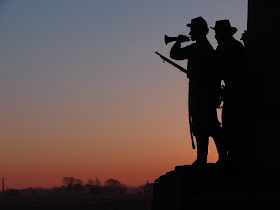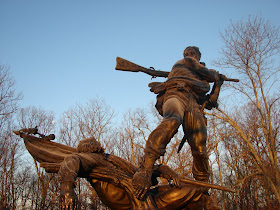In the early hours of Christmas morning in 1861, 150 years ago this Christmas day, a 23 year old Second Lieutenant in the 2nd Massachusetts sat down to write a letter to his mother…
Guard-Tent
Second Massachusetts
Camp
Hicks, near Frederick, MD, 3 ½ o’clock, A.M.
December
25, 1861
Dearest
Mother,
It
is Christmas morning, and I hope it will be a happy and merry one for you all,
though, it looks so stormy for our poor country, one can hardly be in a merry
humour.
I
should be very sorry to have a war with England, even if we had a fine army,
instead of a pack of politicians for officers, with their constituents for rank
and file; and all the more so, of course, thinking that we shall have to take
many “whoppings” before we are worth much. War isn’t declared yet, but doesn’t
it look very much like it to every one at home? Here, we have made up our minds
that we shall have much more soldiering to do than we expected when we started.
I think we may as well consider ourselves settled for life, if we are to have a
war with England! [1]
My
Christmas Eve has been very much like many other eves during the last six
months. On the whole, I have passed quite a pleasant night, though what our men
call the “fore-part” of it was principally occupied in taking care of two drunken
men (one of them with a broken pate), and in tying a sober one to a tree. After
this was over, I did a good deal of reading, and, towards 1 o’clock, A.M., had
some toast and hot coffee, —having previously invited my Sergeant to take a
nap, so that I might not be troubled by hungry eyes, and made to feel mean, for
these wasn’t enough to give any away. The drummer (who, with the Sergeant of
the Guard, for some reason which I never discovered, sits and sleeps in the
officers’ tent) kept groaning in his sleep; and I couldn’t help imagining that
his groan always came in just as I took a bite of toast, of a large gulp of
coffee. This diminished my enjoyment; and when he suddenly said, “Martha! There
isn’t any breakfast”, I was certain that my proceedings were influencing his
dreams!
It
began to snow about midnight, and I suppose no one ever had a better chance of
seeing “Santa Claus”; but, as I had my stockings on, he probably thought it not
worth his while to come down to the guard-tent. I didn’t see any of the guard’s
stockings pinned up outside their tent, and indeed it is contrary to army
regulations for them to divest themselves fo any part of their clothing during
the twenty-four hours.
Please
ask Father to bring me a pocket-revolver, if he can get it, when he comes,—one
small enough to carry in the breast-pocket. Also, tell the girls that Harry
would be very much obliged if they would send him seventy or eighty pairs of
mittens. I heard him say he would like to have some. The men were all glad to
get them, though, as usual, they didn’t express their thanks. They get so many
things that they are spoilt, and think they have a right to all these extras.
Thirteen dollars per month, with board, lodging, and clothes, is more than nine
men out of ten could make at home. Poor soldiers! Poor drumsticks! But this is
not the sort of language for me to use, who am supposed to stand in the light
of half mother to the men of my company. I should like about fifteen more pairs
mittens; and some warm flannel shirts and drawers would be very useful, if
there are any spare ones. “Uncle Sam’s” are miserable things. “Merry Christmas”
and love to all, dear Mother. I suppose Sue is at Mrs. Schuyler’s [a family who
lived on Staten Island]. I am so glad she is coming with you next month! Alex.
And Annie will be here next week.
Your
loving son,
Robert
Gould Shaw [2]
Robert Gould Shaw, the young man who wrote a letter to his mother on Christmas 150 years ago, became the Colonel of the 54th Massachusetts in 1863, the first African American regiment in the Union armed forces during the Civil War. Shaw was killed on July 18, 1863, at the age of 25, leading the famed 54th Massachusetts in its heroic assault against Fort Wagner outside of Charleston, South Carolina. Over 600 men in the 54th Massachusetts made the valiant charge against Fort Wagner: 272, or 45 %, were either killed, wounded, or captured. After the battle, Confederate soldiers buried Shaw in a mass grave with his African American soldiers, seeing it as a sign of disrespect to bury a Union colonel with former slaves. Upon learning of his son’s burial, Shaw’s father replied that his son could have had “no holier place” for a gravesite. His father was quite proud of his son’s conduct and sacrifice, writing to William Lloyd Garrison, “We do thank God that our darling… was chosen, among so many equals, to be the martyred hero of the downtrodden of our land.” [3]
[1] The reference to a war with
England concerns the famed Trent Affair, when the U.S.S. San Jacinto captured Confederate diplomats James Mason and John
Slidell aboard the RMS Trent en route
to England to pursue foreign intervention in the Civil War. The crisis led to
great popular outcry against Britain among the Northern people, as well as
pressures and fears over a war between Great Britain and the North. The tension
was defused when President Lincoln released the two captured Confederate
convoys in late December, 1861.
[2] Robert Gould Shaw, Blue Eyed Child of Fortune: The Civil
War Letters of Colonel Robert Gould Shaw, ed. Russell Duncan (Athens:
University of Georgia Press, 1999), 168-9.
[3] Ibid.,
54.
















































